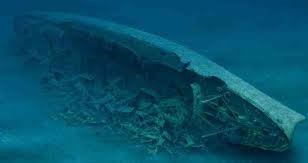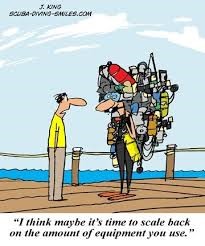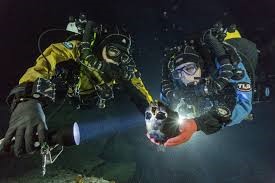Which of the following do you think of when it comes to technical diving?
This?
Maybe this?
Possibly this?
Or all of the above?
Would it surprise you if we said that for most technical divers it isn’t about any of these images? You don’t need to dive deep ship wrecks or explore vast cave systems, or carry excessive equipment to get into technical diving — in fact, most technical divers prefer the concept of simplicity, and seek to gradually step out of their comfort zone. Recreational divers are curious about technical diving for many reasons, the following among them:
- Your inner explorer is calling.
All divers are explorers — it’s likely what drew you to the sport in the first place. You may have reached the point in your dive career where much of what you wish to see lies beyond recreational depth limits, whether it’s wrecks, caves or even certain types of aquatic life.
- You just want to stay longer.
It doesn’t have to be all about depth — many dive sites call for extra time or gas to see more. Most traditional dive tables allow a no-decompression limit at 100 feet (30 m) of just 20 minutes, and this falls to 12 minutes at 130 feet (40 m). While these times can be extended by 1½ to two times longer by diving enriched air — in the 90s this was considered technical diving — this still may not be enough time, or, with a single 80 cubic-foot (12 liter) tank, not enough gas supply.
- You want to advance your knowledge and skill set.
The competition within scuba diving as a sport is generally within yourself, not between divers. Pushing yourself can include advancing your dive technique, improving trim and propulsion, learning new motor skills, increasing knowledge of decompression theory and advanced dive planning, and learning new equipment configurations. The adage “a good diver never stops learning” is a valid impetus to consider an entry-level technical course, as many of the skills and knowledge you learn will be applicable to the outer limits of recreational diving.
Believe it or not, you’ve already had some exposure to technical diving; many of today’s accepted recreational-dive practices originated from what was once thought of as technical diving. Equipment configurations, such as carrying an alternate air source, or diving enriched air, were originally deemed technical practices but are now accepted as mainstream recreational practices. There’s often a gray area between what we call recreational and technical diving that starts at the 100 to 130-foot (30 to 40 m) depth range and past no-decompression limits.
So what’s a good starting point?
A previous article on Scuba Diver Life, 10 Signs You’re a Good Candidate for Tec Diving, can help you decide if you’re ready to take the plunge. If you think technical diving is for you, your most fundamental assets are your foundation as a diver and comfort in the water. You should have a high degree of situational awareness, meaning that you know exactly what’s going on around you at all times and how your decisions will affect a situation. While most dive-training agencies have a minimum certification level or required number of dives for each technical-level course, this is just a minimum. If you can handle a higher level of stress than normal and not be affected by perceptual narrowing, or if you notice subtleties around you, such as micro-bubble leaks coming from a buddy’s hose/regulator, these are usually good indicators of a readiness to enroll in an entry-level tec class.
Florida; Dahab, Egypt; Utila, Honduras; and Subic Bay, Philippines all have established training programs with experienced technical instructors. Learning in a resort based-location allows you to train free from the distractions at home. Easy dive-site logistics mean you can focus more time on the developmental aspects of the course; good visibility and warm waters can allow you more practice time with less chance of being blown out by adverse weather conditions. Training closer to home may be preferable, however, if this is where you plan to conduct the majority of your technical diving in the future.
Choosing an instructor is probably the most important factor in your training. Technical instruction is similar to professional-level instruction in that mentorship, as well as curriculum training, plays an important part in your development. The most popular agencies — PADI, TDI, IANTD, SSI and RAID — all offer similar entry-level technical courses, but it’s important that you feel comfortable with your choice of instructor, that they have a diverse technical background, and that they’re more qualified than the level to which they’re training you.
The PADI Tec 40, TDI Intro to Tech, IANTD Advanced Nitrox, SSI Extended Range Nitrox Diving and RAID OC Deco40 are all entry-level technical diver courses that can be conducted in standardized recreational scuba equipment, with the possible requirements of a stage tank and multi-gas computer. These programs usually keep divers within the traditional recreational sport-diving depth limit of 130 feet (40 m), but allow the diver to go beyond a no-decompression limit and accrue 10 minutes of a decompression obligation. That the equipment used in these courses is very similar to what is used on a recreational dive, and within the same depth limit, make this beginner level a natural progression from rec to tec, and helps satisfy motivations No. 2 and No. 3 above.
So, if you’re a passionate recreational diver with a good comfort level in the water, probably with around logged 100 dives (this is the minimum prerequisite number for some agencies) and have good situational awareness, exemplary buoyancy and a desire to learn more, then taking an entry-level tec class is probably your next logical step. Even if you have no desire to explore deep shipwrecks or caves, or carry excessive amounts of gear, an entry-level tec class will make you a safer diver overall, and give you more secure training for diving the outer edges of even your recreational dive profiles.
Cover image by pratts




